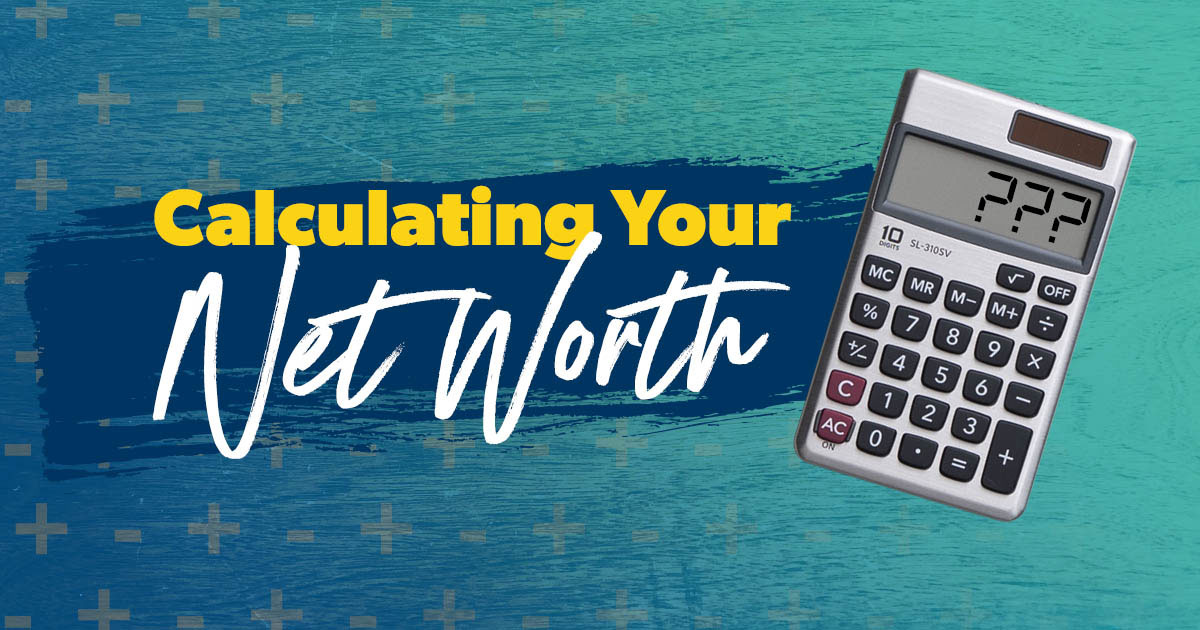
Key Takeaways
- Your net worth is a simple calculation: what you own minus what you owe.
- There are two types of assets: liquid (like cash) and illiquid (stuff you can’t sell quickly).
- When it comes to your liabilities (debts), it’s best if they equal zero.
- Knowing your net worth is important because it will show you if you’re on track for your money goals—and what needs attention.
- Your net worth isn’t your income. Even if you’re a high earner, if you have a lot of debt, you could still be broke!
All of us get a little lost from time to time. Sometimes we just need a landmark to remind us where we are so we can get to where we want to go. When it comes to your money, your net worth is one of the best ways to see where you stand financially. That number essentially says, "You are here," and it can help you get back on track with wealth building.
Market chaos, inflation, your future—work with a pro to navigate this stuff.
So, do you know your net worth?
Figuring out your net worth isn’t rocket science—it’s a simple formula! Once you have all the information you need, running the numbers takes almost no time.
What Is Your Net Worth?
Your net worth is what you own minus what you owe. It’s the total value of all your assets—including your house, cars, investments and cash—minus your liabilities (things like credit card debt, student loans, and what you still owe on your mortgage).
We just made it easier for you to find that number with our Net Worth Calculator. Just answer a few simple questions, and you’ll find out your net worth in five minutes—that’s less time than it takes to drink your morning coffee!
Figuring Out Your Net Worth: What Are Assets and Liabilities?
You can’t calculate your net worth until you know exactly what counts as an asset and what’s a liability. So let’s clearly define what to include in each column before you start crunching the numbers:
Assets
There are two types of assets: liquid and illiquid. A liquid asset is basically cash that’s easy to get to—like money in a money market account. An illiquid asset, on the other hand, can’t be converted to cash quickly. That would be something like a piece of land or a car you’d have to sell to turn into cash.
Both types of assets are part of your net-worth equation and can include:
- Cash: savings and checking accounts
- Retirement accounts and other investments: 401(k), 403(b) and IRAs
- Real estate: the current value of your house and rental properties
- Vehicles: cars, trucks and boats
- Contents of your home: jewelry, art, collector’s items, etc.
Liabilities
Here comes the not-so-fun part: adding up all your liabilities. Liabilities are all the debts and outstanding payments you still have lying around. Basically, it’s the stuff you owe to someone else. Things like:
- Credit cards
- Student loans
- Mortgages
- Car loans
- Medical bills
Of course, it’s best if your liabilities equal zero—which means you don’t owe anything to anyone. But if that’s not the case (yet), get them all down on paper and use the debt snowball method to pay off your debts as quickly as possible. The lower your liabilities, the higher your net worth will be!
Ramsey’s Complete Guide to Investing
Whether you’re a total beginner or experienced investor, this free guide will teach you what you need to know to invest with confidence.
How to Calculate Your Net Worth
Meet Joe. Joe wakes up one day and realizes he’s completely lost financially. He’s not exactly struggling to pay his bills, but deep down inside he knows he could be doing a lot better with his money. First, he needs to figure out where he is by calculating his net worth.
He can do that in three easy steps.
Step 1: Add Up Your Assets (What You Own)
Again, your assets include the stuff you own that has monetary value—everything from your 401(k) account and money in savings to the car sitting in your driveway.
So to get things started, Joe makes a list of his assets. Remember, this is what he owns:
- Home valued at $210,000
- 401(k) with $60,000
- Car worth $15,000
- Savings account balance of $7,000
- Checking account balance of $2,000
Add it all up and Joe has $294,000 in total assets.
Step 2: Add Up Your Liabilities (What You Owe)
Unfortunately, Joe still has some debt lying around. He took out a mortgage (which is okay as long as it’s a 15-year fixed-rate loan) and has some leftover medical bills lying around. But he’s also done some “stupid” with money (haven’t we all?) and piled up some credit card debt and car loans over the years.
Here’s what he owes:
- Credit card debt totaling $12,000
- Student loan debt of $35,000
- Mortgage balance of $175,000
- Car loan of $10,000
- Medical bills equaling $1,000
That list is painful to look at. Joe’s liabilities add up to $233,000.
Now Joe’s ready for the final step.
Step 3: Subtract Your Liabilities From Your Assets
Now all Joe has to do is subtract using this formula:
Total Assets
-Total Liabilities
= Net Worth
So Joe’s total net worth is $61,000:
$294,000 (Assets)
-$233,000 (Liabilities)
= $61,000 (Net Worth)
Keep Boosting Your Investing Know-How
Every two weeks, the Ramsey Investing Newsletter will send you practical insights, easy-to-use resources, and the latest investing news. All explained in plain English.
Why You Need to Know Your Net Worth
Knowing your net worth is all about figuring out where you stand financially. And that’s a good start, but you can’t stop there! The whole point of knowing your net worth is to help you start working toward your financial goals. Here’s how.
1. Your Net Worth Shows Where You Are
Are you saving enough for retirement? Do you have money in your savings account to cover an emergency? What debts do you need to tackle? Your net worth can help you answer these questions. It gives you a clear picture of your current situation.
You may not like where you stand, and that’s okay. The game’s not over yet! If you’re lagging behind in your wealth building, you can still turn things around. You’re never out of the game unless you quit. Don’t quit—push forward. Stay focused, keep your eye on the next goal in front of you, and find ways to make progress.
2. Your Net Worth Shows What Needs to Be Fixed
Ideally, you want your debts to equal a big, fat zero. But if you do have debt, finding your net worth forces you to see what you’re up against. You can’t fix a problem you haven’t identified.
To say goodbye to debt, use the debt snowball method. List your debts from smallest to largest and tackle them as quickly as possible. Getting rid of your debt won’t just free up your income—it’ll also raise your net worth!
You might need to ditch the truck in the driveway. You might need to sell so much stuff the kids think they’re next. Do whatever it takes to get debt out of your life!
If you’ve gotten rid of all your debt except for your mortgage, you’re doing an awesome job. But don’t take your foot off the gas now. Can you make a few extra mortgage payments each year to pay off your house even faster? Imagine how much you could invest for the future with no debt and no more house payments!
3. Your Net Worth Shows How Far You Need to Go
We say that building wealth is more like a marathon than a sprint, and if that’s the case then you need to know where the finish line is! If your net worth shows you where you are in the race, then how much you need to retire represents how much farther you need to go.
The good news is we have a free tool that will help you figure out exactly how much money you need to retire and how much you need to invest each month to get there. You can even play with the numbers here and there to see what would happen if you saved more or spent less. That number will be different for everyone, but it’s important to have a goal to run toward so you’re not running around aimlessly!
If you’re ahead of the game, keep doing what you’re doing and build on the momentum you already have. If you’re behind, it’s time to get serious. No matter where you are, it’s never too late to build wealth and reach your financial goals!
Misconceptions About Net Worth
Now that you know what your net worth is, let’s talk about what it isn’t.
First of all, your net worth is not just the stuff you have. You could have a million dollars in cash and investments, but if you also have a million dollars tied up in mortgages, credit card debt and student loans, you’re not a millionaire—you’re broke!
And second, your net worth is not your income! Just because someone has a high income doesn’t mean they have a high net worth. There’s a myth in our culture that says you have to earn a large income to build wealth. That myth is about as real as a three-dollar bill. A six-figure salary might help, but it won’t lead to a high net worth if you’re not doing the right things with your money.
Ramsey Solutions completed the largest, most comprehensive research study of millionaires in history. We talked to more than 10,000 millionaires—folks whose net worth is at least $1 million—to find out what a real millionaire looks like. What we found might surprise you.
Here’s a hint: It doesn’t matter what your income is, what your career is, or what kind of degree you have—anyone can become a millionaire over time.
In his bestselling book, Baby Steps Millionaires, Dave shares the stories of real people who had average incomes but still became millionaires because of their actions and habits—the same actions and habits that can make you a millionaire too!
Take the Next Step With a Financial Advisor
Knowing your net worth is important, but you can’t stop there. The steps you take after calculating your net worth are just as important. A financial advisor can help you make a plan for your investments so you feel confident about your retirement.
If you need help finding an advisor, check out SmartVestor. You’ll be connected with investment professionals in your area who are ready to help you work toward your retirement goals.
This article provides general guidelines about investing topics. Your situation may be unique. To discuss a plan for your situation, connect with a SmartVestor Pro. Ramsey Solutions is a paid, non-client promoter of participating Pros.



